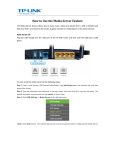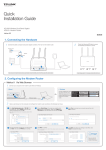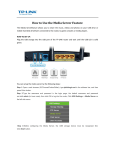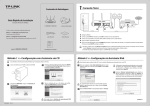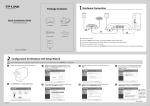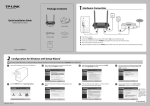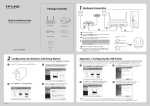Download TP-Link C5 Quick Installation Guide
Transcript
INTERNET Quick Installation Guide Modem 7106504780 REV2.0.0 AC1200 Wireless Dual Band Gigabit Router Typical Connection 1. Connecting the Hardware 1 2 Power off the modem, and remove the backup battery if any. 3 Connect the modem to the Internet port on your router using an Ethernet cable. 4 Power on the modem, wait for 2 minutes and then power on the router. Check the following LED lights to ensure the hardware connection is correct. LAN Power Off Power On INTERNET INTERNET INTERNET Power System 2.4G On Flashing Flashing 5G Internet Flashing On/Flashing Note: If the 2.4G and 5G LEDs are not flashing, please verify that the wireless switch on the rear panel of the router is on. Power On Note: If your Internet comes via an Ethernet cable from the wall instead of any DSL/Cable/Satellite modems, please connect the Ethernet cable directly to the router’s Internet port. 2. Configuring the Router Method 1 Via Web Browser 1 Connect your computer to the router (Wired or Wireless). Wired Wireless Or Wireless On/Off USB1 USB LED USB2 2 a Internet 1 2 Ethernet 3 4 WPS/Reset Ethernet cable Connect wirelessly by using the default network name (SSID) and password on the product label printed on the bottom of the router. Open a web browser on the computer and configure the router according to the following main clues. Enter http://tplinklogin.net in the address bar. Type in admin for both the user name and password and click OK. b Note: If the login window does not appear, please refer to FAQ->Q1. Select your Connection Type and if you are unsure what your connection type is, select Auto-Detect. Click Next and follow the instruction to continue. Note: If an Internet connection is already established, the Quick Setup wizard will bypass Step b and go to Step c . Quick Setup-WAN Connection Type Auto-Detect Dynamic IP (Most Common Cases) admin Static IP admin http://tplinklogin.net PPPoE/Russian PPPoE L2TP/Russian L2TP PPTP/Russian PPTP OK c Choose the frequency you prefer and then click Next. Quick Setup-Wireless Dual Band Selection Concurrently with 2.4GHz and 5GHz (802.11a/b/g/n/ac) Only work in 2.4GHz (802.11b/g/n) Only work in 5GHz (802.11a/n/ac) d Next Back e Click Next to continue. Next Click Finish to complete the setup. You may rename your 2.4GHz/5GHz wireless network name and create your own password. Once done, the wireless connection will disconnect automatically, and you must then sign in with the new names/passwords to regain access to the Internet. 2.4GHz & 5GHz Wireless Network Name and Password Wireless Network Name: Back Quick Setup-Finish Enjoy! TP-LINK_XXGHZ_XXXXXX Region: Warning: Wireless Security: PSK Password: Back Cancel Congratulations! Now your wired and wireless devices can connect to the Internet ! XXXXXXXX Next Back Finish Method 2 Via CD Setup Wizard Note: If you are using a computer that cannot run the mini CD, please refer to Method 1 for configuration. 1 Insert the TP-LINK Resource CD into the CD-ROM drive. 2 Select Archer C5 and then click Easy Setup Assistant. Note: If the main page does not display on your computer, browse the files on the CD and double click Autorun.exe. 3 Choose your language, click START and the Easy Setup Assistant will guide you through the setup process. 4 Click FINISH to complete the setup. Welcome Install Router Archer C5 Easy Setup Assistant Install Router Choose your language: User Guide Configure Router English Application Guide Confirm Settings USB Printer Setup Browse CD Congratulations! Configure Router Welcome Confirm Settings FINISH Enjoy! START EXIT Now your wired and wireless devices can connect to the Internet ! EXIT USB Features The dual USB ports can be used for media sharing, storage sharing and print sharing across your local network. You can also set up the FTP server to access your files remotely by connecting to the Internet. Twin USB sharing ports Note: To learn more about the USB features, please visit http://tp-link.com/app/usb, retrieve Resource CD or simply scan the QR code. Remote Access via FTP Server Local Storage Sharing Media Sharing Printer Sharing Frequently Asked Questions (FAQ) Q1. What can I do if the login window does not appear? Q2. What can I do if I cannot access the Internet? A1. Check if the Internet is working properly by connecting a computer directly to the modem via Ethernet. If not, contact your Internet Service Provider. A2. Open a web browser, enter http://tplinklogin.net and try to set up again. A3. Reboot your router and try again. A1. If the computer is set to a static or fixed IP address, change it to obtain an IP address automatically from the router. A2. Verify http://tplinklogin.net is correctly entered in the web browser. Alternatively, enter http://192.168.0.1 in the web browser and press Enter. A3. Use another web browser and try again. A4. Reboot your router and try again. A5. Disable the network adapter used currently then enable it again. Note: For cable modem users, reboot the modem first. If the problem still exists, go to Network>MAC Clone, then click Clone MAC Address and Save. MAC Clone WAN MAC Address: Your PC’s MAC Address: Q3. How do I restore the router to its factory default settings? A1. With the router in the Power On mode, press and hold down the WPS/Reset Button on the rear panel of the router for approximately 8 seconds. A2. Log in Web Management page of the router, and go to System tools->Factory Defaults, click Restore, then wait until the progress bar loading finished. XX-XX-XX-XX-XX-XX Restore Factory MAC XX-XX-XX-XX-XX-XX Clone MAC Address Save Q4. What can I do if I forget my password? Web Management page password: A. Restore the router to its factory default settings and then use the default User Name ‘admin’ and Password ‘admin’ to log in. Wireless Network password: WPS/Reset Button Press & Hold 8 seconds A1. The factory default password can be found on the product label printed on the bottom of the router. A2. If you have changed your password, log in to the router’s Web Management page, go to Wireless>Wireless Security to obtain or reset your password. Note: If your questions are not answered here, please refer to http://www.tp-link.com/en/support/faq and click Contact Technical Support for further assistance. LED Indicators Name Status Indication (Power) Off On Power is off. Power is on. Off The router has a system error. On The router is initializing or maybe has a system error. Flashing The router is working properly. (Wireless 2.4GHz) Off Flashing The wireless 2.4GHz band is disabled. The wireless 2.4GHz band is working properly. (Wireless 5GHz) Off Flashing The wireless 5GHz band is disabled. The wireless 5GHz band is working properly. (Ethernet) Off On Flashing No device is connected to the corresponding port. Device connected to the corresponding port but no activity. Device connected to the corresponding port and active. On/Off Slow Flash It turns on when a wireless device has been successfully connected to the network via WPS. After about 5 minutes, the WPS LED will turn off. A wireless device is trying to connect to the network via WPS. This process may take up to 2 minutes. Off On No USB device is plugged in to the USB port. USB device(s) plugged in to the USB port. (System) (Internet) (WPS) (USB on the rear panel)


